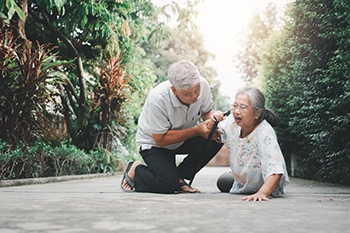
As a person ages, their reflexes, stability, and coordination are likely to diminish. Additionally, they lose strength, and their eyesight generally with time declines. When taken as a whole, these factors can sharply increase the risk of a senior citizen falling. One way of helping to reduce the chances of falling is to improve balance. Experts believe that by spending between 20 and 30 minutes a day to build up muscle strength and improve coordination, a senior may walk more independently and be less likely to fall. One simple exercise to improve balance is by standing on one leg, while lightly holding onto a chair back or wall for stability, for 30 seconds. Then switch legs. Over time and with practice, the goal is to balance for up to one minute. The shuffle step involves lateral movement. Start with your feet together and take a step with the right foot. Then slide the left foot to it. Repeat by traveling to the other side of the room. Reverse. In time, try to increase speed. You may wish to have a healthcare worker or friend be there for support if needed. For more information on exercises to increase stability, strength, and coordination, it is suggested that you make an appointment with a podiatrist.
Preventing falls among the elderly is very important. If you are older and have fallen or fear that you are prone to falling, consult with Imaze Marian Davis, DPM from Marian Davis, DPM, PA. Our doctors will assess your condition and provide you with quality advice and care.
Every 11 seconds, an elderly American is being treated in an emergency room for a fall related injury. Falls are the leading cause of head and hip injuries for those 65 and older. Due to decreases in strength, balance, senses, and lack of awareness, elderly persons are very susceptible to falling. Thankfully, there are a number of things older persons can do to prevent falls.
How to Prevent Falls
Some effective methods that older persons can do to prevent falls include:
- Enrolling in strength and balance exercise program to increase balance and strength
- Periodically having your sight and hearing checked
- Discuss any medications you have with a doctor to see if it increases the risk of falling
- Clearing the house of falling hazards and installing devices like grab bars and railings
- Utilizing a walker or cane
- Wearing shoes that provide good support and cushioning
- Talking to family members about falling and increasing awareness
Falling can be a traumatic and embarrassing experience for elderly persons; this can make them less willing to leave the house, and less willing to talk to someone about their fears of falling. Doing such things, however, will increase the likelihood of tripping or losing one’s balance. Knowing the causes of falling and how to prevent them is the best way to mitigate the risk of serious injury.
If you have any questions, please feel free to contact our office located in Miami, FL . We offer the newest diagnostic and treatment technologies for all your foot care needs.

